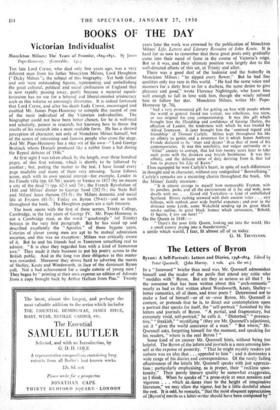BOOKS OF THE DAY
Victorian Individualist
THE late Lord Crewe, who died only five years ago, was a very different man from his father Monckton Milnes, Lord Houghton (" Dicky Manes "), the subject of this biography. Yet both father and son were outstanding figures, representing and embellishing the great cultural, political and social civilisation of England that is now rapidly passing away, partly because a material equali- tarianism has no use for a lettered and liberal-minded aristocracy such as this volume so amusingly illustrates. It is indeed fortunate that Lord Crewe, and after his death Lady Crewe, encouraged and enabled Mr. James Pope-Hennessy to compile this record of one of the most individual of the Victorian individualists. The biographer could not have been better chosen, for he is well-read and scholarly, patient in research, but knowing how to throw the results of his research into a most readable form. He has a shrewd perception of character, not only of Monckton Milnes himself, but of the scores of interesting and famous people who cross the stage. And Mr. Pope-Hennessy has a nice wit of his own-- Lord George Bentinck whom Disraeli produced like a rabbit from a hat during the Repeal debates of 1846."
At first sight I was taken aback by the length, over three hundred pages, of this first volume, which is shortly to be followed by another ; but, putting the matter to the test, I have found every page readable and many of them very amusing. Scene follows scene, each with its own special interest—for example, Landor in his Fiesole villa (pp. 68-70) society at Venice in 1832 (by no means a city of the dead !) (pp. 62-3 and 74) ; the French Revolution of 1848 and Milnes' dinner to George Sand (282-5) ; the State Ball and Milnes' hoax thereon (53-5) ; the Milnes domestic and social life at Fryston (81-7) ; Finlay on Byron (59-61)--and so forth throughout the book. The Houghton papers are a rich treasure.
The book opens with the first of these scenes, Trinity College, Cambridge, in the last years of George IV. Mr. Pope-Hennessy is not a Cambridge man, as the word " quadrangle " (of Trinity) betrays in the very first paragraph. But he has sized up and described excellently the " Apostles " of those bygone years. Coteries of clever young men are apt to be mutual admiration societies, and this was no exception : Milnes was critically aware of it. But he and his friends had in Tennyson something real to admire. "It is clear they regarded him with a kind of humorous awe." They made it their business to put his poetry across to the British public. And in the long run their diligence in this matter was rewarded. ,Moreover they strove hard to advertise the merits of Shelley, Keats and Wordsworth, in face of the dominant Byron cult. Not a bad achievement for a single coterie of young men ! They began by" printing at their own expense an edition of Aclonais from a copy brought back by Arthur Hallam from Pisa." Twenty years later the work was crowned by the publication of Monckton Milnes' Life, Letters and Literary Remains of John Keats. It is hard for us now to remember that these great poets only gradually came into their meed of fame in the course of Victoria's reign. But so it was, and their ultimate position was largely due to the well-directed efforts of this set, at Trinity and after.
There was a good deal of the hedonist and the butterfly irt Monckton Mimes; "he sipped every flower." But he had fine qualities only too rare in this world. "He had the same voice and manners for a dirty brat as for a duchess, the same desire to give pleasure and good," wrote Florence Nightingale, who knew him well enough to fall in love with him, though she wisely refused him to follow her star. Monckton Milnes, writes Mr. Pope- Hennessy (p. 76),
"had a very pronounced gift for getting on best with people whom the world in general found too violent, too rebellious, too stern, or too original for easy companionship. It was this gift which brought him the ffiendship and confidence of George Darley, the affection of Landor, the tenderness with which he was treated by Alfred Tennyson. It dater brought him the 'unmixed regard and friendship' of Thomas( Carlyle. Milnes kept throughout his life an affinity to 'genius and a reverence for it which James Anthony Froude declared to be 'truer and deeper' th An that of most of his contemporaries. It was this sensibility, not vulgar curiousity or a feline"' anxiety to corrupt, that led him-twenty years later to take such pains with the drunken and boyish Swinburne. It was this affinity, and the delicate sense of duty deriving from it, that led him to prepare his Life of Keats."
Thus equipped he won Carlyle's heart, in spite of such differences in thought and in character, without any undignified " Boswellising." Carlyle's remarks are a recurring chorus through'out the book. On the Milnes' family mansion:
"It is almost strange to myself how memorable Fryston, with its porches, parks and all the environment of it far and wide, now dwells with me. . . . Good old Yorkshire—a kind of embellished Scotland. Rivers rushing seaward with their ancient voice .. . airy hilltops, with outlook.aaver wide fruitful expanses ; and ever in the distance some Leeds, some Wakefield sending up its great black smoke outline, its great black banner which announces, 'Behold, 0 Squire, I too am here!
On the Queen in 1848:—
"There's the poor little Queen, looking out into the world, like a small canary prying into a thunderstorm,"
a simile which would, I fear, fit almost all of us today.
G. M. TREVELYAN:










































 Previous page
Previous page